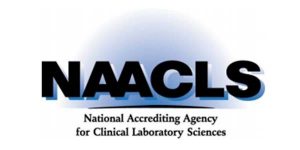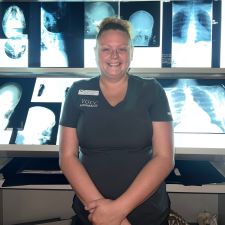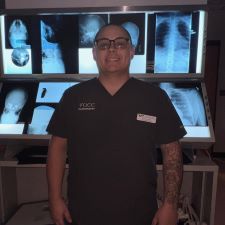This website uses cookies so that we can provide you with the best user experience possible. Cookie information is stored in your browser and performs functions such as recognising you when you return to our website and helping our team to understand which sections of the website you find most interesting and useful.
Histotechnology
Program Description
What is Histotechnology?
Histotechnology is a clinical laboratory specialty related to Histology, a division of anatomy dealing with the microscopic evaluation, composition and function of normal and abnormal tissues. Histologic techniques have been recorded in history as early as the 1600s, with Robert Hooke observing thin slices of cork under the microscope in 1664 and Leeuwenhoek looking at thin sections of biologicals and botanicals in 1670. These events paved the pathway to what has become an important and exciting medical laboratory discipline.
A variety of chemicals and dyes are used to prepare histology specimens and a histologist is trained in their composition and reactivity. With combined chemical and anatomy knowledge, the histologist treats tissue samples to produce a color palette, distinguishing tissue structures. The histologist operates and maintains several pieces of equipment in the preparation of tissue sections for microscopic evaluation and diagnosis.
The Science and the art:
Scientist, anatomist, chemist, artist, medical professional. A career in histotechnology comprises all of these disciplines, and much more. A histologist prepares very thin slices of human, animal or plant tissues for microscopic evaluation. The intricate process of scientific investigations that require tissue examination is essential in establishing and confirming patient diagnosis. Because this process requires a number of different skills, histotechnology is one of the most versatile laboratory professions.
The tasks performed by the histologist require patience, mechanical ability, knowledge of biology, physics, anatomy and chemistry, along with the ability to work quickly with attention to detail. Histotechnology involves five basic steps, each an integral part of the histologist’s job.
| Program Name | Credit Hours | Program Type |
|---|---|---|
| Histotechnology A.A.S. Degree A45370 (Course Sequence) | 69 |
Program Details
Accreditation

The Vance Granville Community College Histotechnology Program is accredited by:
the National Accrediting Agency for Clinical Laboratory Sciences (NAACLS)
5600 N. River Rd, Suite 720
Rosemont, IL 60018
(773) 714-8880 | www.naacls.org.
Students in our program are eligible for the American Society of Clinical Pathology (ASCP) Histotechnology Board of Registry Certification Examination. Learn about getting certified at www.ascp.org
Histotechnology Program Outcomes:
- Students will demonstrate the use of innovative technologies in both the lab and clinical setting.
- Provide students with an education that promotes the recognition, sensitivity, and appreciation of the diverse culture that is inherent throughout the healthcare community.
- Provide the students with an education that promotes ethical and professional behavior.
- Provide the students with an education that promotes effective communication skills, critical thinking skills, and quantitative reasoning through analyzing, synthesizing, and evaluating a variety of situations.
- Provide students with an education that promotes competence in basic skills and application of those skills to the field of Histotechnology.
- Graduate entry-level Histotechnicians to meet the needs of the community.
HT Entry-Level Competencies as Outlined by NAACLS Accreditation Standards:
Upon successful completion of the program students will be able to enter the field of histotechnology being able to perform routine histological procedures such as:
- Receiving and accessioning tissue specimens;
- Preparing tissue specimens for microscopic examinations, including all routine procedures to include:
- Fixation
- Processing
- Embedding/Microtomy
- Staining – basic and special
- Lab Operations;
- Assisting with gross examination and frozen section procedures in histopathology;
- Identifying tissue structures and their staining characteristics;
- Performing preventive and corrective maintenance of equipment and instruments or referring to
appropriate sources for repairs; - Recognizing factors that affect procedures and results, and taking appropriate action within
predetermined limits when corrections are indicated; - Performing and monitoring quality control within predetermined limits;
- Applying principles of safety;
- Demonstrating professional conduct and interpersonal communication skills with patients,
laboratory personnel, other health care professionals, and with the public; - Recognizing the responsibilities of other laboratory and healthcare professionals and interacting
with them with respect for their jobs and patient care; - Recognizing and acting upon individual needs for continuing education as a function of growth
and maintenance of professional competence; - Exercising principles of management, safety, and supervision, as the primary analyst making
specimen oriented decisions on predetermined criteria, including a working knowledge of
criteria values. Communications skills will extend to frequent interactions with members of the
healthcare team, external relations, customer service, and patient education.
Note: The levels of analysis range from routine tissue processing to complex histopathology laboratory procedures in the various major areas of anatomic pathology. The histotechnician will have diverse functions in areas of pre‐analytic, analytic, and post‐analytic processes. The histotechnician will have responsibilities for information processing, training, and quality control monitoring wherever histologic procedures are performed.)
To Apply to the Histotechnology Program, please see the requirements found in the Histotechnology Admission Requirements (PDF).
If you are not already a VGCC student then please check out our Admissions page to apply with VGCC.
Note to Returning or Advance Placement Students: Returning or Advanced Placement students will be considered on an individual basis at the discretion of the Program Head. Please contact Dr. Erica Fleming, Program Head for Histotechnology, if you have questions concerning this information.
Note: Granting the AAS degree in Histotechnology is not contingent upon students passing any type of external certification or licensure examination.
Histotechnology Program Application
Histotechnology Student Handbook
| Graduating Year | HT pass rate ASCP-BOC exam within 1 year of graduation | HT pass rate ASCP-BOC exam greater than 1 year of graduation | % of graduates retained after entering the final year of the program | Graduate Job placement within 1 year of graduation |
|---|---|---|---|---|
| 2022/2023 | 14% (2/8) | 0% (2/2) | 100% | 82% (9/11) |
| 2021/2022 | 60% (3/5) | 25% (1/4 | 100% | 90% (9/10) |
| 2020/2021 | 75% (3/4) | 100% (3/3) | 100% | 100% (6/6) |
| 3 year Average | 47% (8/17) | 37.5% | 100% | 89% |

“The Radiography program has taught me how to succeed in the program and how to provide great patient care. The teachers are a great help in getting you prepared.”

“Vance-Granville’s Radiography program is amazing. They truly care about developing the next generation of Radiologic Technologists. I couldn’t recommend it more to anyone who is curious about the field.”

“I have had an amazing time in this program! Made some friends, learned so much, and had some great experiences.”

